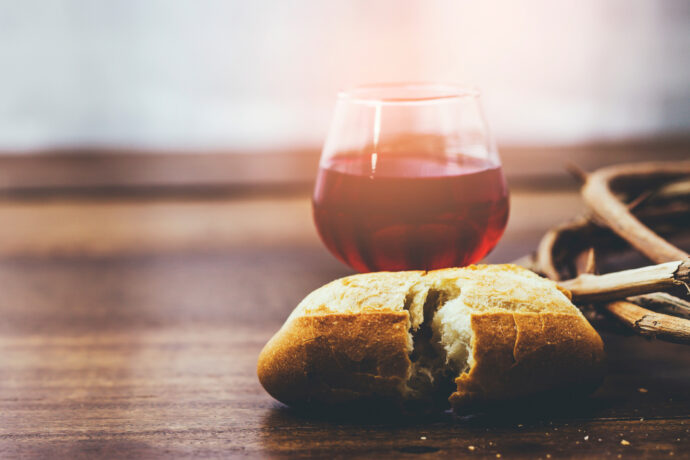“God opposes the proud, but gives grace to the humble.”
—1 Peter 5:5c, NRSV (referencing Proverbs 3:34)
It was my first Sunday as lead pastor. After the sermon, we celebrated the Lord’s Supper together. It was a special moment for me to administer the sacrament for the first time to our congregation. One by one, people came forward to receive the elements. “The body of Christ, broken for you. The blood of Christ, shed for you.”
About midway through the line, one man reached for the plastic cup in the tray and squeezed it too tightly. The cup broke and grape juice splattered on my glasses and white shirt. I smiled, he reached for another cup, and I continued, “The body of Christ, broken for you. The blood of Christ, shed for you.” While the Lord’s Supper is a sacred occasion, it is often filled with real moments of humor and awkwardness. In the Lord’s Supper, the holy and the mundane overlap in a beautiful way, and we participate in the presence of God in our full humanity.
When we consider this sacred occasion, there are two extremes to avoid. One is a rigid formality that diminishes the real-life character of the meal. The other is a haphazard unintentionality that ignores the importance of the gestures we bring to this meal. With those two extremes in mind, I would like to ask the following question: What is the fitting posture for receiving the Lord’s Supper?
The Lord’s Supper is not only an occasion to remember the past event of Christ’s sacrifice, but it is also an occasion to receive the present gift of Christ’s Spirit.
To answer this question, we would do well to recall that, in the Wesleyan-Holiness tradition, the Lord’s Supper is not only an occasion to remember the past event of Christ’s sacrifice, but it is also an occasion to receive the present gift of Christ’s Spirit. To use John Wesley’s language, the Lord’s Supper is a “means of grace,” a practice through which God conveys his presence to us as a gift, thereby transforming us into the image of Christ.
Given this understanding, a fitting posture for receiving the sacrament would be one that induces humility. As 1 Peter 5:5 affirms, “God gives grace to the humble.” The only requirement for receiving grace is a recognition of one’s need. We come to the table not as self-sufficient people but as people wholly dependent on the grace of God for our past, present, and future salvation.
This humility is nurtured by assuming certain postures with our bodies. One such posture is kneeling. The psalmist says, “O come, let us worship and bow down, let us kneel before the Lord, our Maker!” (95:6). By making ourselves low, we acknowledge our smallness, finitude, and dependence on the loving, sovereign Creator. The kneeling of the body facilitates a kneeling of the soul before God, making the soul receptive to grace. This posture of kneeling was the original recommendation of the Church of the Nazarene. The 1908 Manual called churches to “administer Communion to the people while kneeling.”
The second posture is holding one hand over the other with the palms in an open position. This posture may be more practical for many. The pastor or server can place the bread in the hands for intinction, or the bread and the cup in the hands, if the elements are served from trays. With this posture, the elements are received, rather than taken. This posture symbolizes the key theological truth that the grace of God comes to us as a gift. A gift is not taken but received; it is unearned and undeserved.
Opening one’s hands to receive the Lord’s Supper is a striking contrast with the meal of Adam and Eve in the garden of Eden. Adam and Eve “took” the fruit and ate (Genesis 3:6). In doing so, they grasped for equality with God. In the meal of our Lord, we remember the Savior who did not grasp for equality with God but emptied himself to the point of death for our redemption (Philippians 2:5–8). In this meal, we encounter the Savior who continues to give himself by his Spirit for our sanctification. We approach this gift of his presence, not taking or grasping, earning or deserving, but simply receiving with sheer gratitude and deep joy.
What we do in worship matters—including what we do with our bodies.
What we do in worship matters—including what we do with our bodies. While postures like kneeling or opening our hands to receive the Lord’s Supper are not magical, they can help our souls develop certain necessary dispositions toward God, like humility. Pastors must explain these postures frequently and thoughtfully so people can understand the rationale and engage intentionally.
Our culture values self-sufficiency and self-assertion. The posture we bring to the Lord’s Supper is a stark contrast to those values. In approaching the Lord’s Supper either by kneeling or opening our hands, we help our souls become more receptive to grace. Moreover, by assuming these postures in this ritual, we are shaped into a people whose fundamental disposition in life is humility.





0 Comments